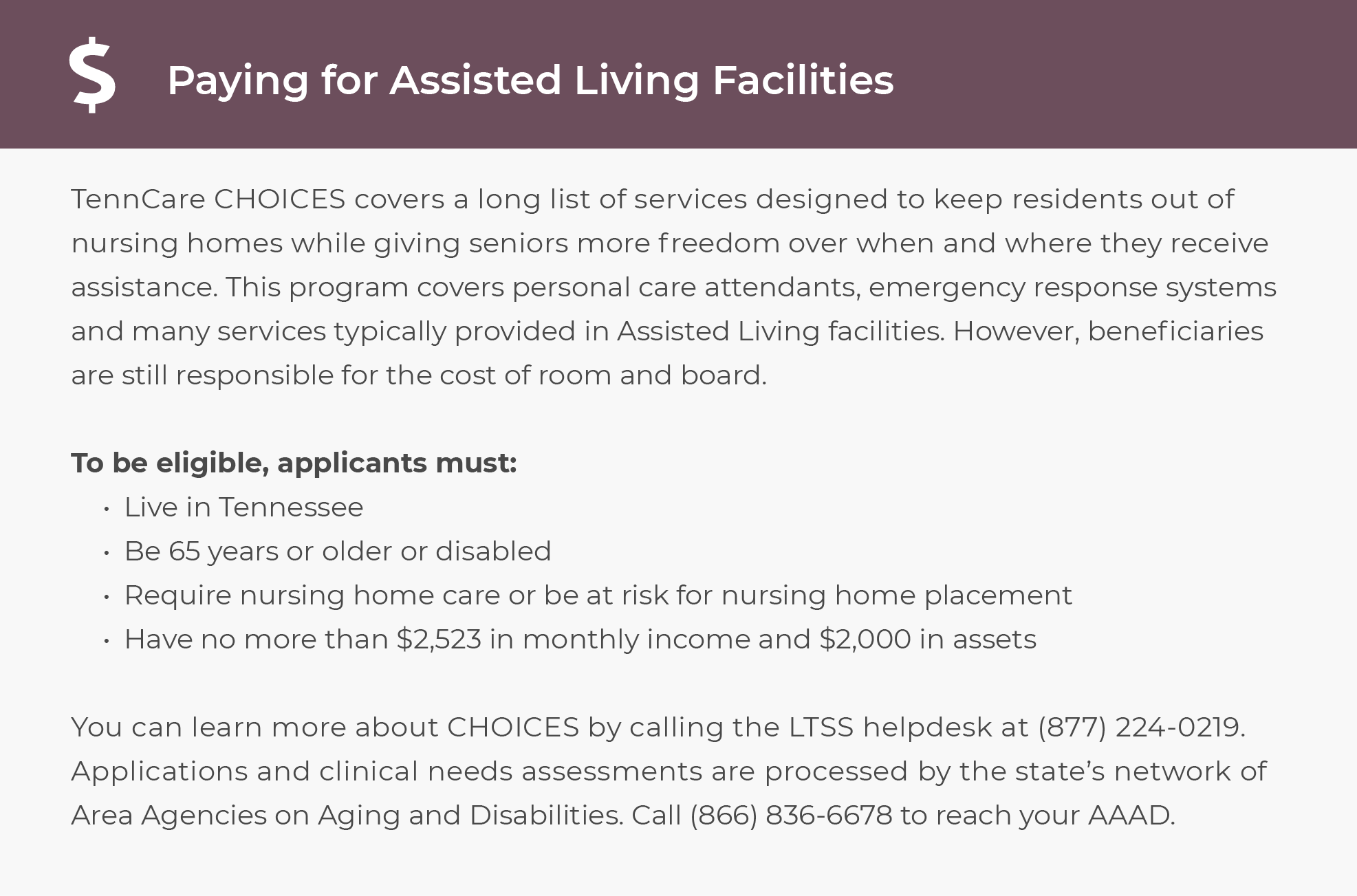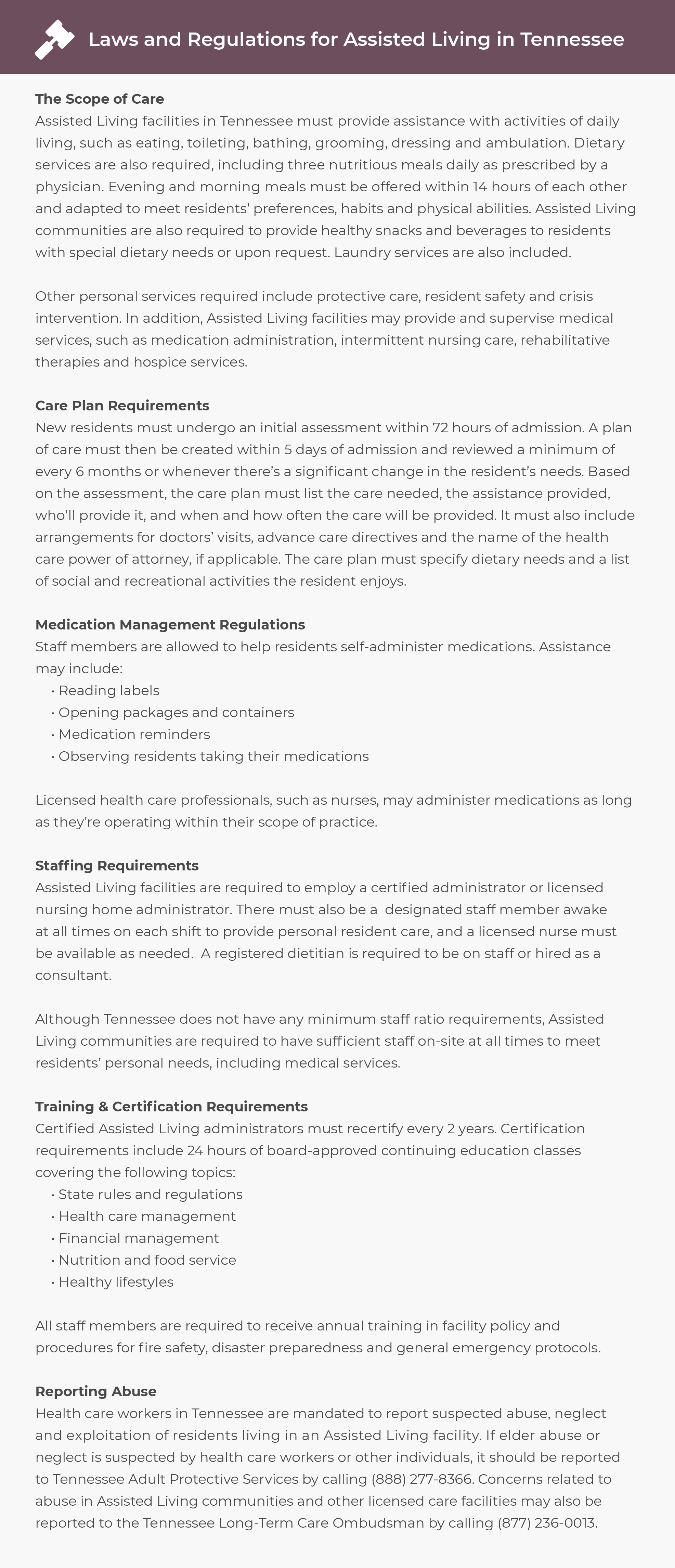Memphis is a culturally rich city known worldwide as the Home of the Blues and Birthplace of Rock ‘n’ Roll. It has over 600,000 residents, about 13% of whom are seniors, and is ideal for those seeking affordability and a wide range of health care options. Overall, its cost of living is about 25% below the national average. This, combined with Tennessee’s lack of state income tax, may help you maintain your standard of living throughout your retirement years. It also provides high access to health care, with approximately 254 doctors per capita compared to 210 nationally.
The Memphis area has numerous assisted living facilities for those who need personal care services but want to maintain their privacy and independence. Through assisted living, you can obtain housing, daily meals and snacks, planned recreational activities and personalized care planning. Seniors in Memphis pay $4,200 per month for these services, which is lower than the national average.
This guide compares assisted living costs in Memphis to rates in other Tennessee cities and provides information about ways you may be able to pay for services and where you can turn for one-on-one help with finding the best care solutions for your needs.
Hundreds of thousands of American seniors utilize assisted living, a figure that is only growing. For these seniors, assisted living combines residential housing,assistance in daily activities, and some healthcare. These communities also strive to provide an atmosphere that is comfortable and engaging for their residents… Read More >
COVID-19 restrictions and rules for Assisted Living Facilities are typically set by the state – to see the rules in your state, you can read our guide to Assisted Living in Tennessee. Keep in mind that there may be other policies that communities put in place to protect their residents, so you should contact your local community for more information. Additionally, you can contact your local Area Agency on Aging to learn more – find contact information here.
In Memphis, assisted living residents pay approximately $4,200 per month for services, according to data compiled in the 2021 Genworth Cost of Care Survey.
Seniors in Memphis pay $4,200 per month for assisted living. This is about $100 higher than the statewide rate of $4,105 but competitive compared to the national average of $4,500.
Assisted living costs in Memphis are moderate at $4,200 per month. In Jackson, care costs are slightly higher at $4,240, and in Kingsport, residents pay $4,445. Assisted living facilities in Cleveland charge the highest surveyed rates in the state at $4,835. Clarksville may be a good option for those seeking more affordable care, with monthly fees coming in about $1,000 below rates in Memphis at $3,215.

Since not everyone can afford to pay for assisted living out-of-pocket, it’s important to find alternative methods to help make assisted living more affordable. Some of these options include:
For more information about your options for making assisted living more affordable, visit our guide to Assisted Living in Tennessee.
|
Resource |
Contact |
Service |
|
(901) 222-2300 |
Memphis is home to six county-run senior centers, providing access to a range of services to those aged 60 and over. Through your local center, you can participate in educational classes, recreational activities and congregate meals. It also provides disease prevention services and general information and assistance regarding community-based services. Hours of operation vary by location. | |
|
(901) 222-4100 |
The Aging Commission of the Mid-South is the designated Area Agency on Aging for the Memphis region. This agency provides free services to those aged 60 and over and can supplement paid services you obtain through assisted living. It has SHIP counselors who provide free, confidential health insurance options counseling for Medicare beneficiaries, as well as benefits screening for public programs that may help cover your assisted living expenses. The agency provides information on CHOICES, the state’s program for older adults who qualify for nursing home level care but want to live in the community. It also facilitates support groups, nutritional counseling, transportation, legal aid and advocacy services. | |
|
(901) 577-2500 |
Porter-Leath RSVP helps volunteers aged 55 and over connect with exclusive services opportunities in Memphis. As an RSVP volunteer, you get to choose how much you serve and in what capacity, and free placement services and on-the-job training ensure you’re ready to serve. Opportunities vary throughout the year, but in general, you may have the option to serve in Head Start centers, libraries, churches, schools and other nonprofit and charitable organizations. | |
|
(901) 529-4565 |
The Long-Term Care Ombudsman Program ensures a high standard of care in assisted living facilities by helping residents understand their rights, receive the services in their care plans and resolve problems, such as substandard care, abuse and neglect. The ombudsman can also help seniors find affordable assisted living communities in their region and identify their options for paying for care. | |
|
(901) 222-4237 |
Shelby County’s Veteran Services division provides older veterans with assistance with applying for compensation and pension programs, including those that may help cover assisted living services. Staff members can help you upload supporting documents for your claims, change the address the VA has on file for you and obtain your service and medical records. | |
|
(901) 523-8822 |
Memphis Area Legal Services specializes in helping older adults resolve civil legal issues, such as obtaining public and veterans’ benefits and disputing denied health insurance claims. It can also help you navigate Medicare, elder abuse and financial exploitation issues, advance directives, PAE denials and qualifying for Medicaid. |
Assisted Living Facilities in the Memphis area are required to follow a set of rules and regulations that are determined at the state level. For an overview of those rules and regulations, see the information below. For more specific information, talk with your local community or Area Agency on Aging.

























